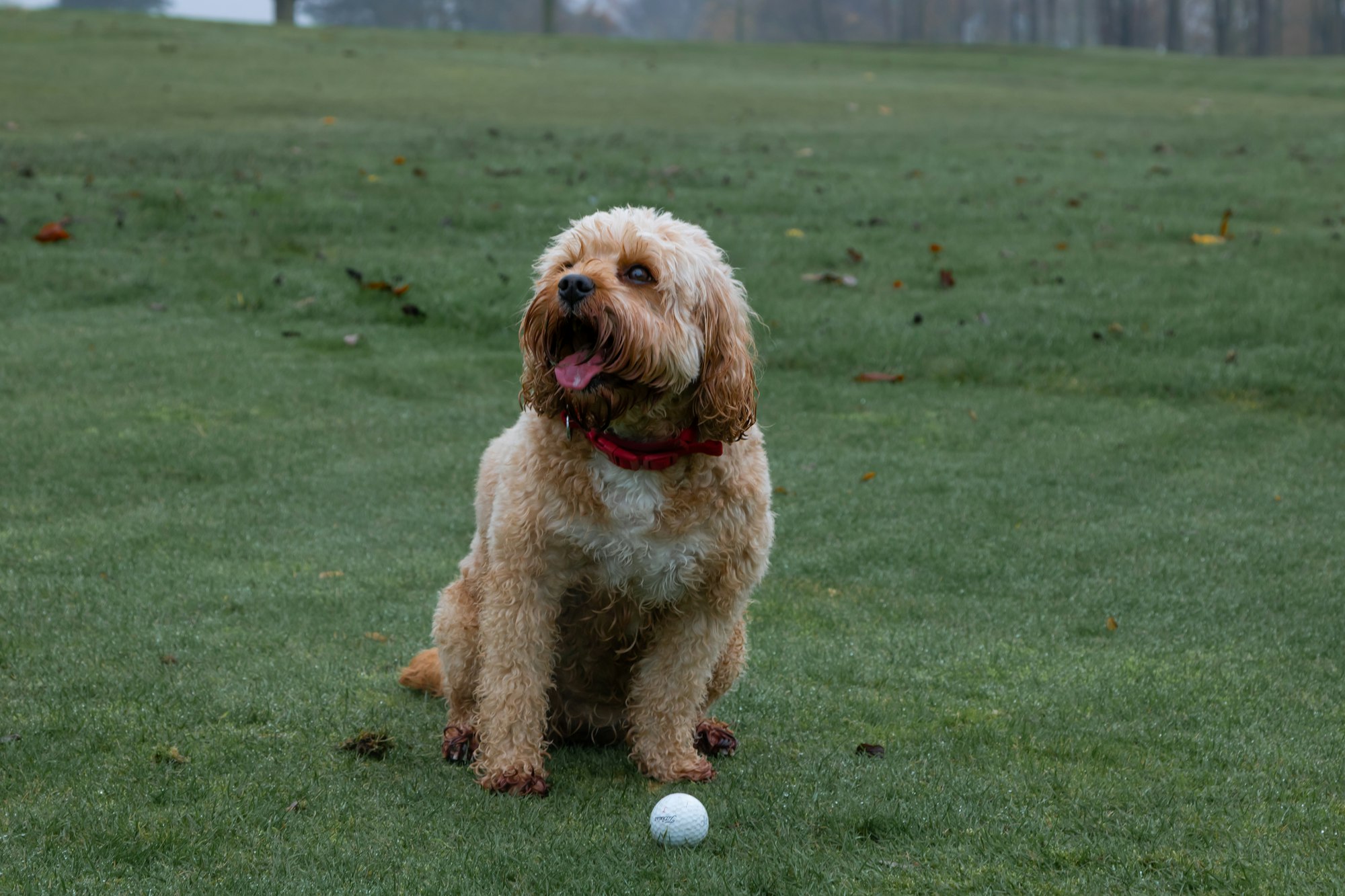So, you're considering bringing a Cavapoo into your life, but one burning question persists: Do Cavapoos bark a lot? These adorable mixed-breed dogs are renowned for their friendly nature, but let's dive deeper into their vocal tendencies to ensure you make an informed decision.

Understanding Cavapoos
Cavapoos are like a delightful canine cocktail, combining the intelligence of Poodles with the affectionate nature of Cavalier King Charles Spaniels. These adorable mixed-breed dogs are renowned for being fantastic companions. But let's dive into the world of Cavapoos, exploring their characteristics and, more specifically, their vocal tendencies.
Cavapoos Unleashed: Understanding the Breed
Before we tackle the barking topic, let's get to know these charming canines a bit better. Cavapoos are the result of careful breeding between Cavalier King Charles Spaniels and Poodles. Picture a pup with a friendly demeanor, a fluffy coat, and eyes that could melt your heart – that's a Cavapoo for you!
These dogs are not just a pretty face; they're intelligent and easygoing, making them ideal for families and individuals alike. Their adaptability extends to various living situations, from apartments to spacious homes. Now, onto the burning question: what's the deal with Cavapoos and barking?

The Bark Symphony: Common Dog Barking Behavior
Barking is to dogs what talking is to humans – it's their way of communicating. But not all barks are created equal. Dogs bark for various reasons, whether it's to alert you to a potential threat, express excitement, or convey anxiety. Understanding the language of barks is crucial, and it applies to Cavapoos too.
Cavapoos, being the sociable beings they are, engage in barking, but it's typically at a moderate level. The key is to discern the purpose behind the bark. Is it a friendly greeting, a sign of distress, or perhaps just a call for attention? Knowing the nuances helps in effectively addressing their vocal expressions.
Cavapoos and Their Vocal Nature: Let's Talk Bark
Now, let's zero in on Cavapoos and their vocal tendencies. While they aren't known to be excessive barkers, factors like individual personality, environment, and upbringing can influence their barking habits.
It's essential to recognize that barking is a form of expression for Cavapoos. They might bark when they're excited to see you, when they sense something unfamiliar, or even when they're feeling a bit lonely. The key is not to suppress their natural instincts but to guide and manage their behavior appropriately.
Training plays a pivotal role in molding a Cavapoo's behavior, including their approach to barking. Positive reinforcement techniques, consistency, and early training contribute to a well-behaved and balanced Cavapoo.
In conclusion, understanding Cavapoos involves appreciating their charming nature and acknowledging their communication style, including their moderate barking tendencies. It's all part of the delightful package that comes with these lovable companions.
Training Cavapoos: Barking Edition
Now that you've welcomed a charming Cavapoo into your home, you might be wondering about the intricacies of training, especially when it comes to their barking habits. Fear not, for training a Cavapoo is not a herculean task – it's more like a delightful journey of understanding and bonding.
Positive Reinforcement for the Win
Cavapoos respond exceptionally well to positive reinforcement. When it comes to barking, reinforcing the behavior you desire is the key. When your Cavapoo keeps it cool and refrains from unnecessary barking, a treat or some extra pets can go a long way. This positive association helps them understand what you expect, making training sessions a joy for both of you.
Consistency is the Secret Sauce
Consistency is the backbone of successful training, and this holds true for Cavapoos too. Establish clear rules regarding barking, and stick to them. If you're okay with a bit of woofing at the doorbell but not incessant barking, make sure everyone in the household is on the same page. A united front makes the training process smoother.
Socialization Impact on Barking
Cavapoos are social butterflies by nature, so exposing them to various social settings is a brilliant way to curb excessive barking. Whether it's meeting new people, encountering other happy dogs, or exploring different environments, socialization helps them become well-rounded individuals. This exposure minimizes anxiety and helps them feel at ease, reducing the likelihood of unnecessary barking.
Playdates, Parks, and Positive Experiences
Arranging playdates for your Cavapoo and taking them to dog-friendly parks are fantastic ways to boost socialization. These experiences create positive associations, making them less likely to bark out of fear or uncertainty. It's like giving them a passport to the world of well-mannered and sociable doggos.
Environmental Triggers for Cavapoo Barking
Understanding what sets off your Cavapoo's barking is crucial for effective training. Identifying environmental triggers helps you address the root cause. Is it the mail carrier, the neighbor's cat, or perhaps a noise that startles them? Once you've pinpointed the triggers, you can work on desensitizing your Cavapoo through gradual exposure and positive reinforcement.
Turning Triggers into Training Opportunities

Instead of viewing triggers as obstacles, consider them as opportunities for training. When your Cavapoo starts barking at the door, use it as a chance to reinforce commands like "quiet" or "enough." With patience and consistency, you'll find that those triggers become less of a barking catalyst and more of a chance to showcase their training prowess.
In the end, training your Cavapoo when it comes to barking is about building trust, setting clear expectations, and turning every interaction into a positive learning experience. With the right approach, you'll have a well-mannered, happy Cavapoo who knows when to bark and when to keep it zen.
Barking as Communication
Ah, the language of barks! When it comes to Cavapoos, those woofs and yips aren't just random noise – they're a form of communication. Understanding what your furry friend is trying to express can deepen the bond between you and your Cavapoo.
Decoding the Woofs
Cavapoos are expressive by nature, and their barks can convey various messages. A sharp, alert bark might mean they've spotted something interesting, while a more prolonged, insistent bark could signal a need for attention. By paying attention to the tone and context, you can become fluent in Cavapoo speak.
Responding to Their Calls
When your Cavapoo barks, it's their way of reaching out to you. Responding with attentiveness reinforces their trust in you as their pack leader. If they're barking at the door, acknowledge their alert but gently guide them into a calmer state. This way, you're fostering effective communication without stifling their natural instincts.
Health Factors and Barking
Barking can also be your Cavapoo's way of signaling distress or discomfort. While they can't vocalize specific ailments, changes in their barking patterns can be indicative of health issues.
When to Listen Closely
If your typically quiet Cavapoo suddenly becomes a chatterbox or if their barking takes on a different tone, it's time to play detective. Schedule a visit to the vet to rule out any potential health concerns. Remember, barking might be their way of saying, "Hey, something's not quite right here."
Wellness Checks and Regular Vet Visits
Regular vet check-ups are a crucial part of responsible pet ownership. Not only do these visits ensure your Cavapoo is in top-notch health, but they also provide an opportunity for you to discuss any changes in behavior, including alterations in barking patterns. A healthy Cavapoo is a happy Cavapoo.
Tips for Managing Cavapoo Barking
Now, let's dive into the practical side of things – managing those adorable barks without dampening your Cavapoo's spirit.
Establish a Routine
Cavapoos thrive on routine. Establishing a consistent daily schedule can help minimize unnecessary barking. From meal times to walks, a predictable routine provides a sense of security for your furry friend.
Mental Stimulation Matters
A bored Cavapoo is a barking Cavapoo. Keep those intelligent minds engaged with puzzle toys, interactive play, and regular exercise. A tired Cavapoo is less likely to resort to excessive barking as a way of burning off energy.
Create a Calm Environment
Whether it's visitors at the door or the mail carrier making a delivery, create a calm environment for your Cavapoo. Teach them that certain situations are nothing to get worked up about, and reward them for maintaining a composed demeanor.
Positive Reinforcement Always Wins
Remember, positive reinforcement is your ally. When your Cavapoo exhibits the desired behavior – be it quietness or calmness – reward them with treats, praise, or a good belly rub. This positive association encourages them to continue behaving in a way that aligns with your expectations.
Managing Cavapoo barking is all about balance. Embrace their communication style, stay attuned to their needs, and provide the guidance they require to be the best-behaved ball of fluff on the block.
Interactive Play and Barking
Time to let the playtime commence! Interactive play is not just a fun way to bond with your Cavapoo; it also plays a role in shaping their behavior, including their barking habits. Let's dive into the world of games, interactive dog toys, and the impact they have on your furry friend's vocal tendencies.

The Power of Play
Interactive play is like a secret handshake between you and your Cavapoo. Engaging in activities that stimulate their mind and body is a surefire way to keep those barks in check. Whether it's a game of fetch, a stimulating puzzle toy, or a squeaky plushie, interactive play provides an outlet for their energy and helps prevent boredom-related barking.
Choosing the Right Toys
Not all toys are created equal, and the same goes for Cavapoos. Experiment with different textures, sizes, and types of toys to see what resonates with your furry friend. Puzzle toys that dispense treats can keep them entertained for longer, giving you some well-deserved peace and quiet.
Balancing Act
While interactive play is a fantastic tool for managing barking, it's crucial to strike a balance. Too much play without a break can lead to overstimulation, potentially resulting in increased barking. Be attuned to your Cavapoo's cues and ensure playtime is enjoyable, not overwhelming.
Real Experiences: Cavapoo Owners Speak
Who better to shed light on Cavapoo barking behavior than those who've experienced it firsthand? Let's hear from Cavapoo owners and gain insights from their real-life stories.
Testimonials from the Trenches
Jessica from Seattle: "When our Cavapoo, Max, started barking excessively, we were puzzled. Turns out, he just wanted more interactive play! Incorporating daily play sessions not only curbed the barking but also brought us closer."
Mark from New York: "Socialization made all the difference for our Cavapoo, Bella. Exposing her to different environments reduced separation anxiety, and the barking diminished. It's like she's telling us, 'I'm confident, and I've got this!'"
Lessons Learned
Real experiences teach us that every Cavapoo is unique, and what works for one might not for another. The key is to be adaptable, pay attention to their cues, and tailor your approach based on their individual needs.
Myths vs. Facts: Cavapoos and Barking
Let's bust some myths and get to the facts about Cavapoos and their barking tendencies. Separating fiction from reality ensures you approach your furry friend with accurate expectations.
Myth: All Cavapoos Bark Excessively
Fact: While Cavapoos are known to bark, not all of them are excessive barkers. Training, socialization, and individual temperament play significant roles in determining their barking habits.
Myth: Cavapoos Can't Be Trained to Stop Barking
Fact: Cavapoos are intelligent and respond well to training. With consistency and positive reinforcement, you can train your Cavapoo to bark less or on command.
Myth: Excessive Barking Is Always a Behavioral Issue
Fact: Sometimes, excessive barking can be linked to health concerns. Regular vet check-ups are essential to rule out any underlying medical issues contributing to the barking.
Myth: Cavapoos Bark Only for Attention
Fact: While attention-seeking is one reason Cavapoos bark, they may also bark due to fear, excitement, or as a response to environmental stimuli. Understanding the context helps address the root cause.
Conclusion
In conclusion, while Cavapoos may bark, understanding the factors influencing their vocal habits is key to managing and enjoying their company. With proper training, socialization, and attention to their needs, you can foster a strong bond with your Cavapoo.

Frequently Asked Questions (FAQs)
- Q1: Do all Cavapoos bark excessively?
- No, each Cavapoo is unique, and their barking tendencies can vary. Proper training and socialization play crucial roles in managing their behavior.
- Q2: Are there specific triggers that cause Cavapoos to bark more?
- Environmental factors, such as new experiences or loud noises, can trigger excessive barking in Cavapoos. Identifying and minimizing these triggers can help.
- Q3: How can I train my Cavapoo to bark less?
- Positive reinforcement techniques, consistent training, and providing mental stimulation are effective ways to train a Cavapoo to bark less.
- Q4: When should I be concerned about my Cavapoo's barking?
- If there is a sudden change in your Cavapoo's barking behavior or if it seems excessive and unexplained, it's advisable to consult with a veterinarian to rule out any health issues.
- Q5: Can Cavapoos be trained not to bark at all?
- While complete elimination of barking may be unrealistic, consistent training can help minimize excessive barking in Cavapoos.